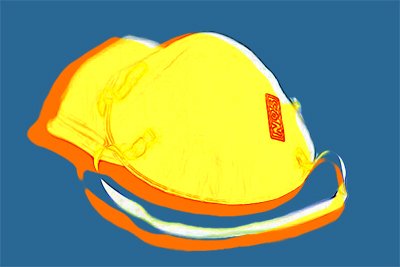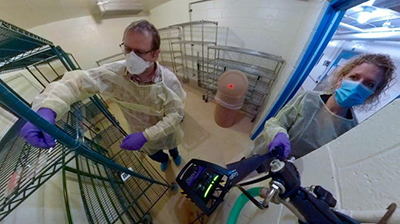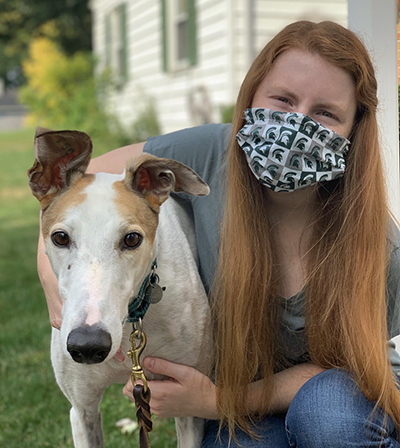

The coronavirus pandemic has altered life and caused death around the world. Faculty, students, and staff at the MSU College of Veterinary Medicine, along with their partners, are working to combat COVID-19 through enhanced and innovative educational, investigative, clinical, and public health efforts.
The College’s first priority was protecting the safety, health, and wellbeing of its students, faculty, staff, clinical patients, and diagnostic clients. Part of protection is education. The College, in partnership with the MSU Institute for Quantitative Health Science and Engineering and the Michigan Department of Health and Human Services, hosted virtual townhalls centered on COVID-19. Expert faculty from the College and other groups across campus discussed various dimensions of the pandemic with a special emphasis on science, health, and veterinary medicine.
“Educating our community about coronavirus was an important part of engaging them in the College’s overall work to prevent the virus from spreading throughout our community,” says Dr. Birgit Puschner, dean of the College.
“Understanding the science can make an important difference in influencing health behaviors. Because of how dangerous COVID-19 has proven to be, and because the College has had frontline workers on-site since day one of the pandemic, we knew we had to garner as much support as possible from our own community in order to best protect ourselves and our loved ones.”
SARS-CoV-2, the virus that causes the disease COVID-19 in humans, is suspected to be zoonotic, which means it originated in animals and is transmissible to humans. Naturally, this led to much concern among the public, most especially pet owners.
“Our faculty became worried that, without more information, some people may become fearful of their animals or, even worse, would consider abandoning them in an effort to protect their families and themselves,” says Dr. Annette O’Connor, chairperson for the Department of Large Animal Clinical Sciences, professor of epidemiology, and interim co-director for the MSU Veterinary Medical Center. “Working with media to engage in science communication is a great tool for sharing facts and easing concerns in a responsible way.”
O’Connor focused on science communication to share information and veterinary-related advice about COVID-19 with pet owners and other members of the public. Also front-and-center in the news was Dr. Adam Moeser, Matilda R. Wilson Endowed Chair and professor for the Department of Large Animal Clinical Sciences. Moeser is an immunologist who studies the ways in which biological sex and early-life stress work together to impact vulnerability to immune-mediated disease later in life. Specifically, he studies the mast cell, the human immune system’s first responder to pathogenic invasions.
“When it comes to COVID-19, there’s a global pattern of males dying more frequently than females, despite similar infection rates,” says Moeser, who also runs the College’s Gastrointestinal Stress Biology Laboratory. “My lab’s research findings show that females have stronger immune responses, which may be giving them the upper hand when it comes to fighting off coronavirus disease.”
According to Moeser, a better understanding of biological sex differences could lead to more targeted therapeutics and preventatives for many diseases and medical conditions including illnesses like COVID-19.
“Generally, males are the ones tested and studied in scientific research, not females—that includes both animals and humans. This has led to a skewed understanding of the disease process that impacts health outcomes today,” says Moeser. “By studying only one sex in research, we are missing opportunities to discover potentially new and more effective therapies tailored for woman and men. Sex bias in scientific research needs to be undone, and it’s our hope that work like ours can help prioritize that for leaders in science, public health, and policy.”
O’Connor for MSUToday: Ask the Expert: Pets and COVID-19
O’Connor for The Conversation: Can your pets get coronavirus, and can you catch it from them?
O’Connor for Business Insider: The FDA is recommending cats and dogs practice social distancing, too
Moeser for The Conversation: COVID-19’s deadliness for men is revealing why researchers should have been studying immune system sex differences years ago
The MSU Veterinary Medical Center continued to see patients during the pandemic, which offered College researchers the opportunity to learn more about COVID-19’s prevalence in companion animals and various pet- and owner-related factors that might be associated with infection. Dr. Daniel Langlois, associate professor for the Department of Small Animal Clinical Sciences, is working with Dr. Steven Bolin, professor for the Department of Pathobiology and Diagnostic Investigation, and other College faculty to fill in these gaps through a combination of polymerase chain reaction, or PCR, and antibody testing, as well as pet owner surveys.
“We really do not know what impact COVID-19 has had on the pet population in our area,” says Langlois. “We hope to identify which pets, if any, actually warrant testing. At the same time, our results should better inform safety protocols and use of personal protective equipment in veterinary hospitals.”
Veterinary medicine isn’t just about animals. There’s a lot of overlap—and room for collaboration—between human and animal health care practitioners.

Dr. Claire Hankenson, director of MSU Campus Animal Resources (CAR), University attending veterinarian, and professor for the Department of Pathobiology and Diagnostic Investigation, along with her CAR team, thought to apply an existing decontamination method that uses vaporized hydrogen peroxide (VHP) to sanitize personal protective equipment (PPE) so that it can be safely reused by health care providers in an emergency. In particular, N95 masks are critical in the prevention of pathogenic airborne particulate exposure. Sanitation extends mask life during supply shortages; it also saves health care dollars when PPE supply chains are stressed or interrupted.
During spring 2020, Hankenson and her team partnered closely with Sparrow Health and Henry Ford Health Systems to collect project data for the US Food and Drug Administration (FDA). On July 24, 2020, this MSU VHP decontamination process was granted exclusive FDA Emergency Use Authorization; to date, MSU is the first and only public institution to achieve this approval.

“We estimate that within our dedicated facility, running the VHP cycles five days a week, we can effectively decontaminate and redistribute approximately 14,000 masks per day and up to 70,000 masks per week,” Hankenson says. “Over the fall and early winter—with a potential second surge of COVID-19 cases in the state, and which may converge with influenza season—the MSU VHP decontamination process could ultimately recycle more than one million PPE devices back into the supply for the state of Michigan.”
Hankenson for the Today Show: “Fogging” technology could help battle coronavirus
Hankenson for MSUToday: MSU receives FDA-authorization to decontaminate reusable N95 masks for hospitals
MSU’s Reopening Campus Task Force committed $1.4 million to the launch of the COVID-19 Community Detection Program, also known as Spartan Spit. This program aims to track the SARS-CoV-2 virus throughout campus, with special emphasis on identifying “hotspots,” through pooled saliva testing. The MSU Colleges of Human Medicine and Veterinary Medicine piloted the program.
CCDP page: MSU’s COVID-19 Early Detection Program
July 31 townhall: MSU Human Medicine and Veterinary Medicine COVID town hall
Birgit’s sample collection video: Watch Dean Puschner’s Spartan Spit sample collection video

Researchers at the College also wondered how the pandemic could impact the human-animal bond between pets and their owners. Dr. Kirk Munoz, assistant professor for the Department of Small Animal Clinical Sciences, is working with Dr. Jane Manfredi, assistant professor for the Department of Pathobiology and Diagnostic Investigation; Megan Allen, a second-year veterinary student at MSU; and Dr. Alanna Johnson at the University of Florida to survey pet owners in Michigan and Florida. This multi-center study was designed to collect and compare data from both states, which will be used to assess the impact that COVID-19 has had on how people interact with their pets. The researchers received more than 1,000 responses in each state, which consisted of clients, faculty, students, and staff of both universities.
“We know the human-animal bond offers many benefits to people, such as improved mental health,” says Munoz. “Gathering this information from pet owners and noting whether they are medically trained or not could provide us with important insights into how COVID-19 is affecting our relationships with our most beloved animals.”
O’Connor also is studying the relationship between pets and owners. She worked with the College’s small and large animal faculty, as well as animal welfare specialists from Iowa State University, to study the ways in which pets helped people during the pandemic.
Faculty from MSU and Iowa State University worked together to research how pets are helping people during the pandemic.
“Early in the pandemic, our group approached Dr. Srinand Sreevatsan, associate dean of Research and Graduate Studies, about the potential to research this topic,” says O’Connor. “The Office of Research and Graduate Studies was extremely supportive. We were able to obtain funding from the Michigan State University College of Veterinary Medicine Endowment Research Funds to survey the effect of pet ownership on human health and other areas of interest. Without the responsive funding, we would not have been able to react quickly and conduct the survey in a timely manner.”
“We were able to survey more than 700 people—approximately 50 percent of whom were pet owners—and survey more than 400 of those multiple times during the early stages of the pandemic,” continues O’Connor. “There’s much more investigating to do, but our preliminary analysis suggests that pet owners were less likely to feel lonely. While we expected this result, it confirms the importance of pets and the human-animal bond.”
Preliminary subset of study data: Dr. O’Connor’s preliminary subset of study data
Dr. Annette O’Connor and Dr. Daniel Langlois’ research is funded by the College’s Companion Animal Fund, which supports projects that aim to improve the health and wellbeing of companion animals.
You can support research like this at the MSU College of Veterinary Medicine through direct donations, estate planning, and other forms of giving. The College’s Office of Development and Alumni Relations can help you determine a gift that best fits with your goals and the College’s mission.
Connect with us today to support critical veterinary education, research, clinical work, and public health efforts.
In January 2020, experts at MSU’s Veterinary Diagnostic Laboratory began monitoring SARS-CoV-2. As the pandemic evolved, the Laboratory started work on an in-house test for animals that would not deplete reagents or supplies necessary for human testing. At the same time, experts used protocols from the Centers for Disease Control and Prevention to set up and validate a diagnostic test for humans. If additional testing capacity is needed, the Laboratory has made all necessary preparations to test human samples.
“The Laboratory is well-versed in processing infectious disease samples, including those with potential to infect humans. The building was constructed to facilitate testing for a zoonotic disease outbreak, with enhanced biosafety spaces to accommodate safe handling and containment of high-consequence diseases,” says Bolin, professor and associate director of the Laboratory. “What we did not expect when designing those features was that we would be called upon to respond to a human health crisis of this magnitude. We have spent hundreds of hours creating, obtaining, and evaluating methods, reagents, and equipment for diagnostic use in animals and humans for detection of SARS-CoV-2.”
While the novel coronavirus appears to have originated in animals, there is no current evidence that suggests animals play a major role in spreading COVID-19. Routine testing of animals for SARS-CoV-2 is not recommended, but the Laboratory was quickly identified as a key resource, should that testing be required in the future.
“Preparation is what we do,” says Bolin. “It’s why we’re here, to support animal and human health.”

Did you love this story? Share it on social media
and tag us @msuvets.